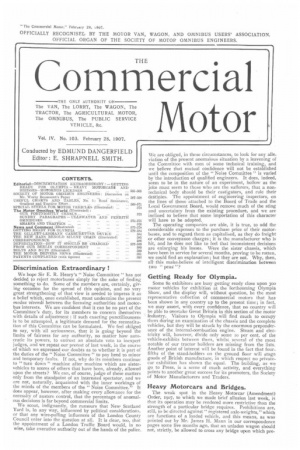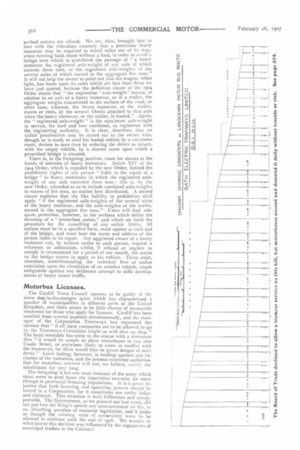Discrimination Extraordinary !
Page 1

Page 2

If you've noticed an error in this article please click here to report it so we can fix it.
We hope Sir E. R. Henry's "Noise Committee" has not decided to reject motorbuses simply for the sake of finding something to do. Some of the members are, certainly, giving occasion for the spread of this opinion, and no very great strengthening of that view is needed to impress it as a belief which, once established, must undermine the present modus vivendi between the licensing authorities and motorbus interests. We are confident that it can be no part of the Committee's duty, for its members to concern themselves with details of adjustment : if such exacting punctiliousness is to be attempted, a legitimate demand for the reconstitution of this Committee can be formulated. We feel obliged to say, with all seriousness, that it is going beyond the limits of fairness for any authority, no matter how, autocratic its powers, to entrust an absolute veto 10 inexpert judges, and we repeat our protest of last week, in the course of which we expressed our doubts as to whether it is part or the duties of the " Noise Committee " to pay heed to minor and temporary faults. If not, why do its members continue to "turn down " machine after machine which are sistervehicles to scores of others that have been, already, allowed upon the streets? We can, of course, judge of these matters only from the standpoint of an interested spectator, and we are not, naturally, acquainted with the inner workings of the minds of the members of the " Noise Committee." It does appear, however, after making every allowance for the necessity of austere control, that the percentage of anomalous decisions is far beyond commercial limits. We scout, indignantly, the rumours that New, Scotland Yard is, in any way, influenced by political considerations, or that any wire-pulling influences of the London County Council enter into the question at all. It is clear, too, that the appointment of a London Traflic Board would, in no wise, take executive authority out of the hands of the police.
We are obliged, in these circumstances, to look for any alleviation of the present anomalous situation by a leavening of the Committee with men of some technical training, and we believe that mutual confidence will not be established until the composition of the "Noise Committee" is varied by the introduction of qualified engineers. It does, indeed, seem to be in the nature of an experiment, hollow as the joke must seem to those who are the sufferers, that a nontechnical body should be their castigators, and rule their destinies. The appointment of engineering inspectors, on the lines of those attached to the Board of Trade and the Local Government Board, would remove much of the sting and uncertainty from the existing procedure, and we are inclined to believe that some importation of this character will have to be adopted. The operating companies are able, it is true, to add the considerable expenses to the purchase price of their motorbuses, and to regard them as capitalised, as they do freight or other conveyance charges; it is the manufacturer who is hit, and he does not like to feel that inconsistent decisions are enlarging his losses. Were the sister chassis, which have been in service for several months, proving to be rotten, we could find an explanation ; but they are not. Why, then, all this make-believe of intelligent discrimination between two " peas"?
Getting Ready for Olympia.
Some 8o exhibitors are busy getting ready close upon 300 motor vehicles for exhibition at the forthcoming Olympia Show, and the display will, without question, be the most representative collection of commercial motors that has been shown in any country up to the present time ; in fact, we may assert, with every confidence, that no country will be able to overtake Great Britain in this section of the motor industry. Visitors to Olympia will find much to occupy them during an examination of the chassis and the complete vehicles, but they will be struck by the enormous preponderance of the internal-combustion engine. Steam and electricity will, however, divide only some to per cent, of the vehicle-exhibits between them, whilst several of the most notable of our tractor builders are missing from the lists. Another point of interest will be found in the fact that fourfifths of the stand-holders on the ground floor will stage goods of British manufacture, in which respect no privatecar exhibition has shown the equal. The building, as we go to Press, is a scene of much activity, and everything points to another great success for its promoters, the Society of Motor Manufacturers and Traders.
Heavy Motorcars and Bridges.
The weak spot in the Heavy Motorcar (Amendment) Order, 1907, to which we made brief allusion last week, is that its operation may be rendered more restrictive than the strength of a particular bridge requires. Prohibitions are, still, to be directed against "registered axle-weights," which are functions of a loaded vehicle, and this means, as was pointed out by Mr. James H. Mann in our correspondence pages some five months ago, that an unladen wagon should not, strictly, be allowed to cross any bridge upon which pre
scribed notices are affixed. We are, thus, brought face to face with the ridiculous anomaly that a particular heavy motorcar may be required to travel miles out of its way, when running back home without a load, in order to avoid a bridge over which is prohibited the passage of "a heavy motorcar the registered axle--weight of any axle of which exceeds three tons, or the registered axle-weights of the several axles of which exceed in the aggregate five tons." It will not help the owner to point out that his wagon, when light, has loads upon its axles which are less than those we have just quoted, because the definition clause of the 1904 Order states that " the expression axle-weight ' means, in relation to an axle of a heavy motorcar, or of a trailer, the aggregate weight transmitted to the surface of the road, or other base, whereon the heavy motorcar, or the trailer, moves or rests, by the several wheels attached to that axle when the heavy motorcar, or the trailer, is loaded." Again, the " registered axle-weight " is the maximum axle-weight in service, for load and tare combined, as registered with the registering authority. It is clear, therefore, that an unfair penalisation may be meted out to the owner who, though he is ready to send his loaded vehicle by a circuitous route, desires to save time by ordering the driver to return, with the empty vehicle, by a shorter route upon which a prescribed bridge is situated. There is, in the foregoing position, room for abuses at the hands of enemies of heavy motorcars. Article XIV of the 1904 Order, which is repealed by the new Order, limited the prohibitory rights of any person liable to the repair of a bridge " to heavy motorcars in which the registered axleweight of any axle exceeded three tons : this is, by the new Order, extended so as to include combined axle-weights in excess of five tons, no matter how distributed. A second clause explains that the like liability to prohibition shall apply "if the registered axle-weights of the several axles of the heavy motorcar, and the axle-weights of the trailer, exceed in the aggregate five tons." Users will find adequate protection, however, in the sections which define the meaning of a "prescribed notice," and which set forth the procedure for the cancelling of any unfair limits. An notices must be in a specified form, must appear at each end of the bridge, and must bear the name and address of the person liable to its repair. Any aggrieved owner of a heavy motorcar can, by written notice to such person, request a reference to arbitration, whilst, if refusal or neglect to comply is encountered for a period of one month, the notice on the bridge ceases to apply to his vehicle. There exist, therefore, notwithstanding the technical flaw of undue restriction upon. the circulation of an unladen vehicle, ample safeguards against any deliberate attempt to stifle developments of heavy motor traffic.
Motorbus Licenses.
The Cardiff Town Council appears to be guilty of the same dog-in-the-manger spirit which has characterised a number of municipalities in different parts of the Limited Kingdom, and there seems to be little chance of reasonable treatment for those who apply for licenses. Cardiff has been assailed from several quarters simultaneously, and the manager of the Corporation Tramways has expressed the opinion that " if all these companies are to be allowed to go in, the Tramways Committee might as well shut up shop." The head constable has come to the rescue with a statement that "it would be unsafe to allow motorbuses to run into Castle Street, or anywhere likely to come in conflict with the tramways, for there would then be grave danger of accidents." Local feeling, however, is tending against any exclusion of the motorbus, and the present restricted authorisation for motorbus services will not, we believe, satisfy the inhabitants for very long.
The foregoing is but one more instance of the many which must serve to send home the imperative necessity for some change in provincial licensing regulations. It is a gross injustice that both licensing and operating powers should be vested in a Corporation, for it constitutes one entity judge and claimant. This situation is both Gilbertian and unsupportable. The Government, as we pointed out last week, did not put into the wing's speech any announcement on the, to us, absorbing question of motorcar legislation, and it looks as though the existing state of uacortaintv were to be allowed to continue until the end of 19°8. We wonder to what extent this decision was influenced by the -arguments of municipal traders in the Cabinet?




























